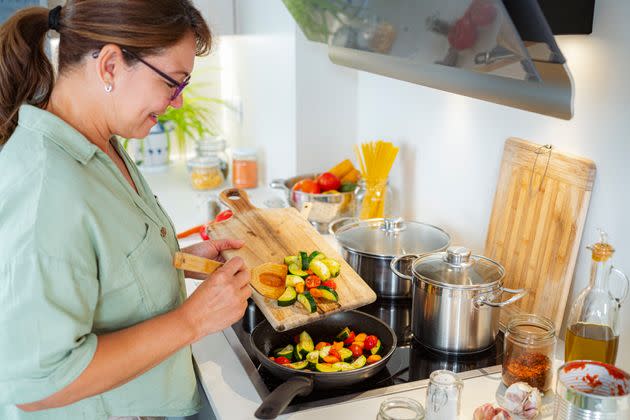I'm A Nutritionist, Here Are 5 Ways To Incorporate More Plants Into Your Diet On A Budget

If you’ve been looking to improve your overall gut health, experts recommend starting with plant points.
This is because food isn’t just about fuelling your body. It’s about nurturing your gut microbiota, the community of over 100 trillion bacteria that inhabit your gastrointestinal tract. Research shows that those who eat more than 30 different types of plants per week have a more diverse gut microbiome compared to those who eat fewer than 10 plants.
Of course, this isn’t always simple, especially during a cost of living crisis when grocery prices are soaring. We spoke to Dr Emily Prpa, nutritionist and Science Manager at Yakult about some wallet-friendly tips for incorporating plant points into your diet.
So, what are plant points?
Plant points are an easy way of monitoring and encouraging dietary diversity. Points are given for each type of plant-based food eaten in a week from these categories: legumes, nuts, seeds, whole grains, vegetables, fruits, herbs, and spices. For each different type and colour of plant consumed, one point can be added to your weekly total (e.g., 1 green pepper + 1 red pepper = 2 points). A quarter point is given for consuming herbs, spices, tea, coffee, and extra virgin olive oil.)
How to boost plant points on a budget
Eat seasonally, where possible
Prpa said: “Eating seasonal fruits and veggies is both cost-effective and nutritionally beneficial. Seasonal produce is typically cheaper due to local abundance and supermarket deals.
“Additionally, seasonal foods are fresher and more nutritious because they have a shorter journey from farm to fork, minimising nutrient loss. By rotating your produce with the seasons, you naturally diversify your meals instead of sticking to a limited selection year-round.”
Grow your own herbs
Prpa said: “Growing your own herbs can significantly reduce costs and add freshness to your meals. Some of the easiest herbs to grow include mint, basil, parsley, chives, and rosemary.
If you have no access to a garden or a small living space, Prpa assures that you may still be able to do this, saying: “Even with limited space, a windowsill herb garden can provide a steady supply of flavourful additions to your dishes.
“Use basil in dressings, soups, or salads, and sprinkle parsley into omelettes, sauces, or salads for a burst of flavour and nutrients.”
Opt for the convenience of canned foods
Prpa said that incorporating tinned foods into your diet is an easy and cost-effective way to boost your plant points.
“Tinned pulses like beans, lentils, and chickpeas are versatile and packed with protein and fibre. They can be used in a variety of dishes, from soups and stews to salads while tinned tomatoes are perfect for recipes like ragu and curry.”
Buy frozen fruits and vegetables
Frozen fruits and vegetables are versatile ingredients that can be used in a variety of dishes, such as stir-fries, smoothies, or as side dishes. They retain their nutrients due to the rapid freezing process, extending their shelf-life and reducing food waste.
Utilise discount apps and stores’ discount schemes
Prpa said: “Discount apps and stores are useful for stretching your grocery budget. Lidl is renowned for its ‘Too Good To Waste’ £1.50 boxes, typically containing slightly damaged or discoloured still perfectly fine to eat.
“Additionally, through the Too Good To Go app, supermarkets like Aldi and Morrisons offer ‘Surprise Bags’ of unsold food valued at up to £10, which customers can purchase for a much-reduced price of £3-£4.”

